What happens now that a deal's been done?published at 18:49 GMT 30 December 2020
The UK and EU begin a new relationship on 1 January 2021.
Read MoreScience Committee investigates ocean environment
Commons day begins with Scotland questions
PMQs at noon
MPs look at Bus Services Bill
Lords starts with oral questions at 3pm
Peers debating Brexit bill this afternoon and evening
Claire Gould, Kate Whannel and Ben Butcher
The UK and EU begin a new relationship on 1 January 2021.
Read MoreBrexit Bill
 House of Lords
House of Lords
Parliament
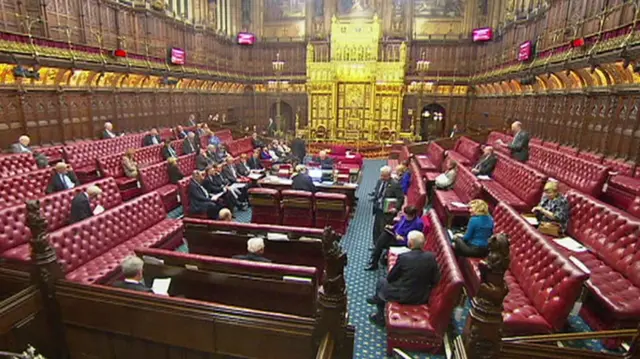 Image source, HoL
Image source, HoLLabour's Lea of Crondall speaks to his amendment which requires the prime minister to publish a report on the government's approach to the UK's co-operation with the European technical agencies.
That is where we have to leave our coverage of the House of Lords.
Peers return tomorrow at 11am for oral questions.
Brexit Bill
 House of Lords
House of Lords
Parliament
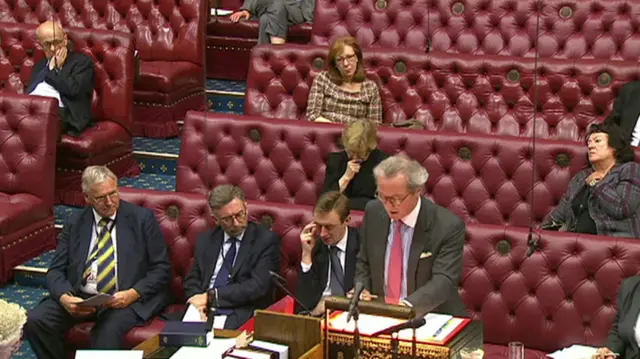 Image source, HoL
Image source, HoLGovernment spokesman Lord Keen of Elie gets to his feet to cheers from his colleagues.
This is because he is now responding to one of the last group of amendments in the committee stage.
Lord Keen tells peers that there has been "regular and ongoing engagement" with the devolved nations adding that the prime minister's first visit on being elected was to Edinburgh.
He adds that it is important "not to tie the government's hands" and urges peers to withdraw their amendments.
Brexit Bill
 House of Lords
House of Lords
Parliament
Ulster Unionist peer Lord Empey questions the feasibility of consulting the Northern Ireland government given that the "executive has imploded".
Lib Dem Baroness Ludford says that you don't have to be from a devolved region to support these amendments.
"You can even be a dastardly Londoner," she adds.
Brexit Bill
 House of Lords
House of Lords
Parliament
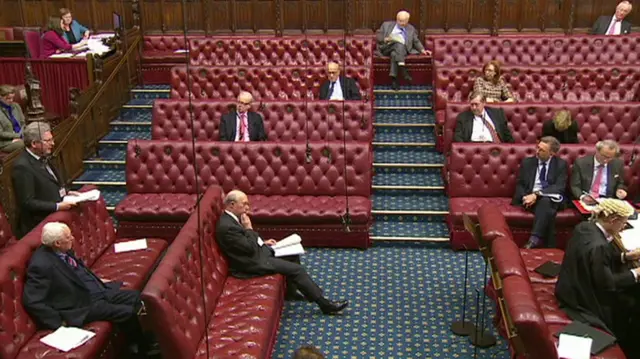 Image source, HoL
Image source, HoLCrossbencher Earl of Kinnoull fears that the amendments in this group could lead to a "Wallonia-type situation" in the UK.
Last year the Belgian region of Wallonia was able to, temporarily, block a trade deal between the EU and Canada.
Research department tweets
Allow X content?
This article contains content provided by X. We ask for your permission before anything is loaded, as they may be using cookies and other technologies. You may want to read X’s cookie policy, external and privacy policy, external before accepting. To view this content choose ‘accept and continue’.
Brexit Bill
 House of Lords
House of Lords
Parliament
Crossbench peer Lord Elystan-Morgan supports amendment 43 on the grounds that when England and Wales deal with each other it is "not on the basis of partnership and equality".
"The cobwebs of colonialism still exist," he warns.
Lib Dem Baroness Randerson argues that the amendments establishing "formal structures" for negotiations are needed because "mere assurances will be totally inadequate".
Brexit Bill
 House of Lords
House of Lords
Parliament
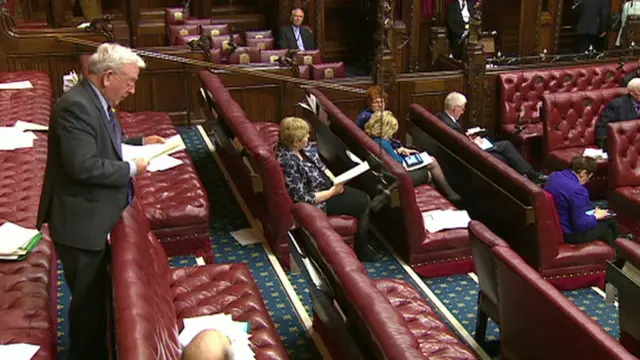 Image source, HoL
Image source, HoLWhat matters, argues Plaid Cymru peer Lord Wigley, is that Edinburgh, Belfast and Cardiff feel that the government is working with them "as partners".
He acknowledges that "power rests in London".
However, he warns the government that it will "be creating problems for itself" if it does not give the opinions of the devolved administrations "serious thought".
Brexit Bill
 House of Lords
House of Lords
Parliament

Lord Pannick withdraws his amendment "for now" leaving open the possibility that this will return at report stage next week.
Peers move on to the next (and last) group of amendments for the evening.
These amendments deal with the role of the devolved nations during the negotiations.
Brexit Bill
 House of Lords
House of Lords
Parliament
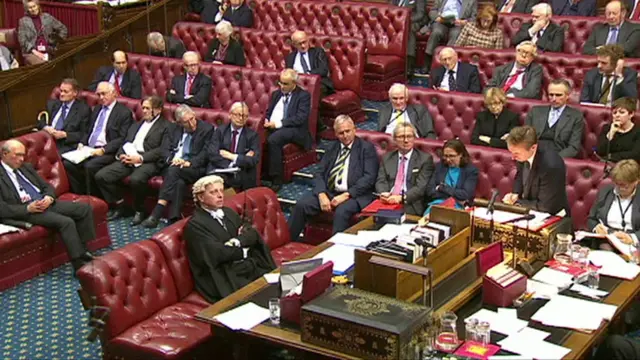 Image source, HoL
Image source, HoLBrexit Minister Lord Bridges warns the House that his response will be "brutally" simple.
The majority of people voted to leave the EU, he says.
He tells peers that the government's offer of a parliamentary vote on the final deal was described by the shadow Brexit secretary Keir Starmer as "huge and very important".
Lord Bridges says the vote will be "the most meaningful vote imaginable".
However, he clarifies that the vote will be on how the UK leaves the EU "not whether we leave the EU".
"That decision has already been made at the ballot box."
Peers are debating committee stage of the EU (Notification of Withdrawal) Bill - and it's second day of that stage. Report stage is the next stage, and that'll come next week.
Brexit Bill
 House of Lords
House of Lords
Parliament
The government will negotiate the exit deal but Parliament must approve it, says Labour spokeswoman Baroness Hayter.
She notes that it is written in law that European Parliament must give consent to any deal, but not the UK Parliament.
The prime minister's assurance "is not good enough", she argues.
Brexit Bill
 House of Lords
House of Lords
Parliament
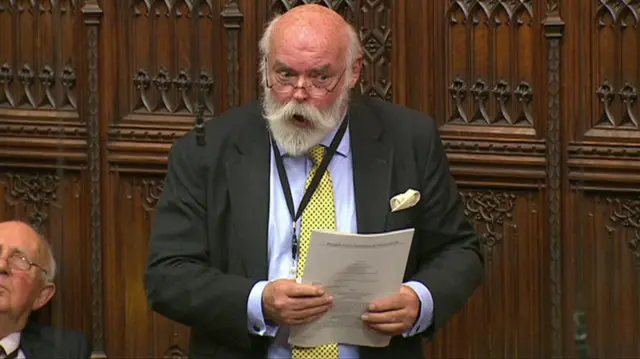 Image source, HoL
Image source, HoLCrossbencher peer and former clerk in the House of Commons Lord Lisvane asks what happens if one House approves a motion and the other rejects it.
He suggests that a solution would be to inroduce legislation which has "well understood mechanisms" for securing agreement between the two Houses.
Brexit Bill
 House of Lords
House of Lords
Parliament
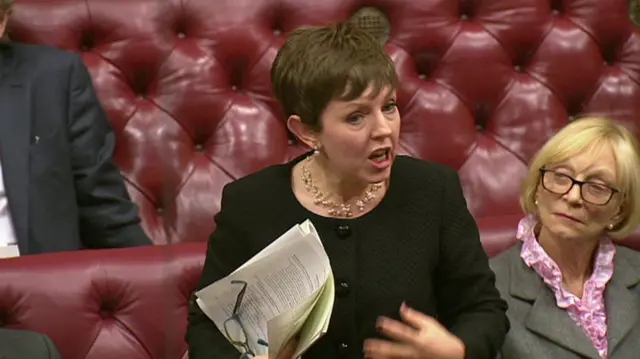 Image source, HoL
Image source, HoLConservative peer and former Leader of the House of Lords Baroness Stowell of Beeston warns that approving the amendment will "fuel distrust" in the House of Lords.
People in the referendum voted for more sovereignty, she says but adds that they also wanted "a reblanacing of power".
They did not necessarily want all control and power to sit in parliament, she says.
"I think we should reflect on that."
Brexit Bill
 House of Lords
House of Lords
Parliament
Conservative peer Lord Deben supports the amendments urging peers to "stand up for sovereignty".
He points out that for today's debate to take place a case had to go to the Supreme Court.
Therefore, he argues, this House ought to ensure that there is "a copper-bottomed statutory protection" for what the prime minister has promised.
Brexit Bill
 House of Lords
House of Lords
Parliament
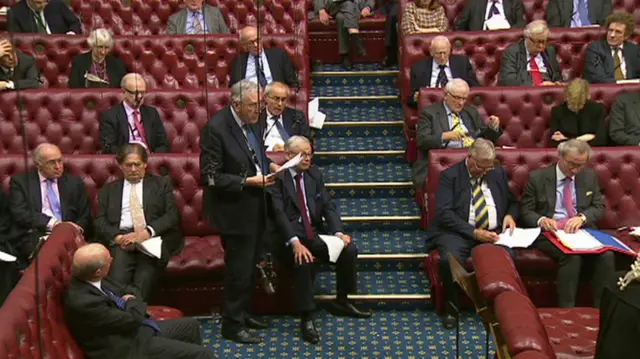 Image source, HoL
Image source, HoLConservative peer Lord Howell of Guildford says that MPs already have the power to bring matters to Parliament through devices and procedures.
These "elaborate" amendments, he argues, do not fit in with the way Parliament works adding that the amendments "create an absurdity".
It's all very well voting on motions, intervenes Lord Hope of Craighead, but "legislation is key".
Lord Howell points out that MPs were able to stop the government conducting military action against Syria through a motion rather than legislation.
Brexit Bill
 House of Lords
House of Lords
Parliament
What happens if there is no deal? asks Labour's Baroness Kennedy.
She says that if the UK leaves the EU without an agreement and has to revert to World Trade Organisation (WTO) rules, rights will be lost.
If no deal is reached, Parliament should have the option to vote on whether to revert to WTO rules or remain in the EU, she argues.
She suggests that there will be no vote on these amendments tonight but urges peers to bring back these amendments at report stage which will take place next week.
Peers vote by 358 to 256 to guarantee EU citizens' rights to stay in the UK after Brexit.
Read MoreGovernment sources sound relaxed despite their Lords defeat - but the Brexit bill could face more trouble ahead.
Read MoreBreixt Bill
 House of Lords
House of Lords
Parliament
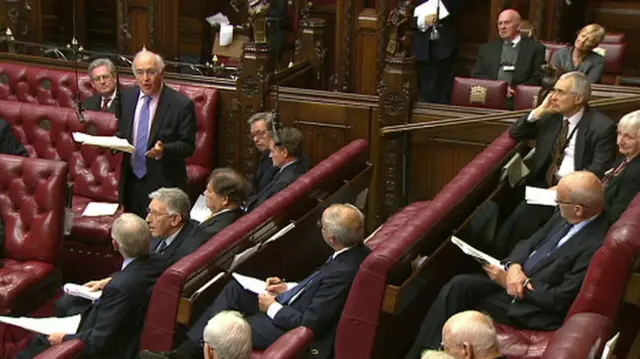 Image source, HoL
Image source, HoLThe amendment is wrong in principle, constitutionally improper and unnecessary, argues Conservative Lord Howard.
He admits that he may be either "rather courageous" of "foolhardy" going up against Lord Pannick, the lawyer who won the Supreme Court case against the government on Article 50.
His reasoning, he tells peers, is that it is not the job of Parliament to negotiate with foreign powers.
In terms of sovereignty, he argues that Parliament has the power to pass a vote of no confidence in the government and is therefore "always supreme".